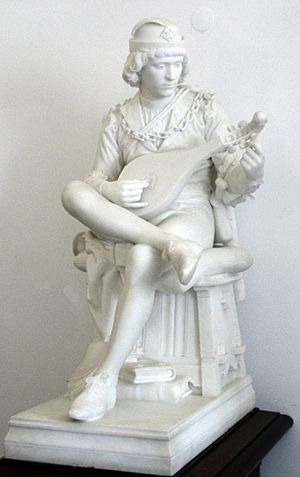Bernardim Ribeiro facts for kids
Quick facts for kids
Bernardim Ribeiro
|
|
|---|---|

Bernardim Ribeiro, marble sculpture by António Alberto Nunes.
|
|
| Born | 1482 Torrão, Portugal
|
| Died | October 1552 (aged 69–70) |
| Nationality | Portuguese |
| Occupation | Poet and writer |
Bernardim Ribeiro (born 1482, died October 1552) was a famous Portuguese poet and writer. He lived during the Renaissance, a time when Europe saw a rebirth of art, science, and literature. He is known for his beautiful poems and his important book, Menina e Moça.
Contents
Early Life of Bernardim Ribeiro
Bernardim Ribeiro was born in a place called Torrão in Alentejo, Portugal. When he was young, his father, Damião Ribeiro, was involved in a secret plan against King John II in 1484. Because of this, his father had to escape to Castile (which is now part of Spain).
Young Bernardim and his mother found a safe place to stay. They lived with their relatives, António and Inês Zagalo, at a farm called Quinta dos Lobos, near Sintra.
A New King and New Opportunities
In 1495, Manuel I became the new king of Portugal. He decided to help the families who had been treated unfairly by the previous king. This meant Bernardim could leave his hiding place and go back to Torrão.
Meanwhile, Dona Inês, his relative, had married a wealthy landowner. In 1503, she was asked to come to the royal court. She became one of the helpers for Infanta Beatriz, who was a princess.
Bernardim went with her to the court. Because of Dona Inês's influence, King Manuel I took Bernardim under his care. The king sent him to the University of Lisbon to study. He studied there from 1506 to 1512.
Becoming a Royal Secretary
After Bernardim finished his law degree, the king showed him even more kindness. He gave Bernardim a job as the Escrivão da Câmara, which means "secretary of the royal chamber." This was a very important position.
Later, the king also gave him the special honor of joining the Military Order of Saint James of the Sword. This was a religious and military group.
Later Life and Writings
Bernardim Ribeiro returned home in 1524. The new king, John III, gave him back his old job as royal secretary. It is said that he visited a special person at a convent and found her very unwell. After this, his own health and mental state began to decline.
Around 1534, he became very ill for a long time. He continued to get weaker until he passed away. He could not do his job anymore. In 1549, the king gave him money each year (a pension) to help him live. He did not live much longer after that. Bernardim Ribeiro died in October 1552 at All Saints Hospital in Lisbon.
His Famous Book: Menina e Moça
Bernardim Ribeiro's most famous book is called Menina e Moça. It was not printed until after he died. The first time it was published was in 1554 in a city called Ferrara.
When the book came out, it caused a lot of excitement. Some people even said it should not be read because it seemed to tell a real-life story about a family, even though it was written as an allegory (a story with a hidden meaning).
The book has two parts. Most people agree that Bernardim Ribeiro wrote the first part. However, there have been different ideas about who wrote the second part. There have been several new editions of his work over the years, making sure his stories and poems can still be read today. His poems, including five special types of poems called eclogues, were also reprinted.
See also
 In Spanish: Bernardim Ribeiro para niños
In Spanish: Bernardim Ribeiro para niños
 | Lonnie Johnson |
 | Granville Woods |
 | Lewis Howard Latimer |
 | James West |

